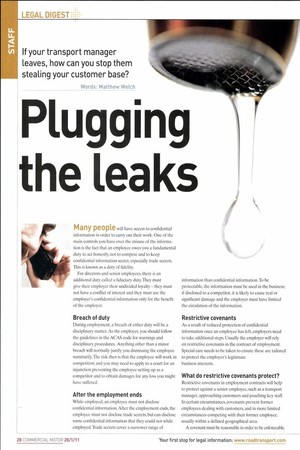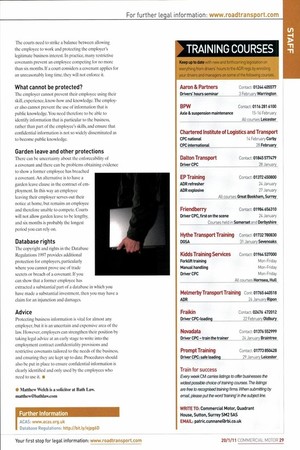Plugging the teaks
Page 28

Page 29

If you've noticed an error in this article please click here to report it so we can fix it.
If your transport manager leaves, how can you stop them stealing your customer base?
Words: Matthew Welch
Many people will have access to confidential information in order to carry out their work. One of the main controls you have over the misuse of the information is the fact that an employee owes you a fundamental duty to act honestly, not to compete and to keep confidential information secret, especially trade secrets. This is known as a duty of fidelity.
For directors and senior employees, there is an additional duty called a fiduciary duty. They must give their employer their undivided loyalty — they must not have a conflict of interest and they must use the employer's confidential information only for the benefit of the employer.
Breach of duty
During employment, a breach of either duty will be a disciplinary matter. As the employer, you should follow the guidelines in the ACAS code for warnings and disciplinary procedures. Anything other than a minor breach will normally justify you dismissing the employee summarily. The risk then is that the employee will work in competition and you may need to apply to a court for an injunction preventing the employee setting up as a competitor and to obtain damages for any loss you might have suffered.
After the employment ends
While employed, an employee must not disclose confidential information. After the employment ends, the employee must not disclose trade secrets, but can disclose some confidential information that they could not while employed. Trade secrets cover a narrower range of information than confidential information. To be protectable, the information must be used in the business; if disclosed to a competitor, it is likely to cause real or significant damage and the employer must have limited the circulation of the information.
Restrictive covenants
As a result of reduced protection of confidential information once an employee has left, employers need to take additional steps. Usually the employer will rely on restrictive covenants in the contract of employment. Special care needs to be taken to ensure these are tailored to protect the employer's legitimate business interests.
What do restrictive covenants protect?
Restrictive covenants in employment contracts will help to protect against a senior employee, such as a transport manager, approaching customers and poaching key staff. In certain circumstances, covenants prevent former employees dealing with customers, and in more limited circumstances competing with their former employer, usually within a defined geographical area.
A covenant must be reasonable in order to be enforceable. The courts need to strike a balance between allowing the employee to work and protecting the employer's legitimate business interest. In practice, many restrictive covenants prevent an employee competing for no more than six months. If a court considers a covenant applies for an unreasonably long time, they will not enforce it.
What cannot be protected?
The employer cannot prevent their employee using their skill, experience, know-how and knowledge. The employer also cannot prevent the use of information that is public knowledge. You need therefore to be able to identify information that is particular to the business, rather than part of the employee's skills, and ensure that confidential information is not so widely disseminated as to become public knowledge.
Garden leave and other protections There can be uncertainty about the enforceability of a covenant and there can be problems obtaining evidence to show a former employee has breached a covenant. An alternative is to have a garden leave clause in the contract of employment. In this way an employee leaving their employer serves out their notice at home, but remains an employee and therefore unable to compete. Courts will not allow garden leave to be lengthy, and six months is probably the longest period you can rely on.
Database rights The copyright and rights in the Database Regulations 1997 provides additional protection for employers, particularly where you cannot prove use of trade secrets or breach of a covenant. If you can show that a former employee has extracted a substantial part of a database in which you have made a substantial investment, then you may have a claim for an injunction and damages.
Advice Protecting business information is vital for almost any employer, but it is an uncertain and expensive area of the law. However, employers can strengthen their position by taking legal advice at an early stage to write into the employment contract confidentiality provisions and restrictive covenants tailored to the needs of the business, and ensuring they are kept up to date. Procedures should also be put in place to ensure confidential information is clearly identified and only used by the employees who need to use it. IN
• Matthew Welch is a solicitor at Bath Law. matthew@batldaw.com
Further Information IACAS: www.acas.org.uk Database Regulations: http://bitly/ejpg6D
































































































































